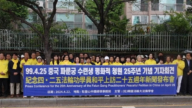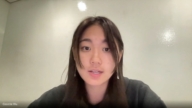【新唐人2013年11月06日訊】上個月,美國非政府組織「自由之家(Freedom House)」在報告中披露,中共新聞審查延伸海外,日前,原「加拿大華人協進會全國總會」副會長馮玉蘭在多倫多的一次公開演講中也指出,近20年來,中共當局通過國安等情報部門,對具有戰略意義的國家實施六種策略,爭奪輿論控制權。請看報導。
自香港移民加拿大、現居多倫多的馮玉蘭在演講中表示,由於加拿大擁有中國奇缺的資源,如﹕石油和稀有重金屬,以及制約未來發展的淡水資源等,而成為中共國際媒體戰略的重要目標。
《法國國際廣播電臺》引述馮玉蘭的話報導說,中共為控制在多倫多、溫哥華和蒙特利爾等,這些華人集中居住的大城市媒體,主要實施了六種策略,包括收購有影響力的媒體,控制媒體文章內容,或乾脆全資創辦新媒體;或用間接方式影響本地媒體對中國的報導;或採用親疏有別、內外有別,以不同的政策對待不同的媒體;以及對媒體管理層和一線記者施壓;人員滲透;網絡入侵。而為了更有效的控制,中共往往採取多種策略併進的方式。
「加拿大民主中國陣線」主席盛雪表示,由於中共一貫的性質和它的本性,它一直都在進行所謂的大外宣和軟實力著陸,不斷的向西方民主國家進行滲透。
「加拿大民主中國陣線」主席盛雪:「按它們自己的話說,叫做所謂爭奪話語權,它希望用它中共的意識形態,不單單是影響它自己的國民、影響在海外的僑民,同樣要影響西方的民主國家。西方民主國家信仰的基本普世價值是自由、人權、民主、法制,中共正好和這個普世價值相反,如果不去爭奪這個整個的這樣的意識形態,它知道它自己的政權是不可能長久的。」
2008年北京奧運之前的3月,西藏拉薩爆發藏人大規模抗議活動,遭到中共鎮壓,當時西方主流媒體包括《BBC》、《美國之音》等給予高度關注和報導。
加拿大主要的英文報紙《星報》對這個事件也做了一個特別報導,可它的合作夥伴《星島日報》在把這篇文章轉載、翻譯成中文時,進行了加工和修改歪曲,引起當地一些團體的反彈。
盛雪:「修改了大標題,中間加了一些立場非常鮮明、而且是非常不公正的小標題;將英文報導當中的一些比較中肯的採訪和一些披露事實真相的部分,完全給刪除了,加上了中文報紙自己的一些主觀評論在裡面。」
另外,北京當局還利用獨家資源施壓加拿大主流媒體,甚至是加拿大英文媒體。
2008年「加拿大廣播公司CBC」為爭取北京奧運轉播權,在中領館的壓力下,把一部關於中國活摘人體器官的記錄片,刪除了最敏感的內容後播出。
馮玉蘭指出,中共以不同的政策對待不同的媒體,特別是打壓批評中共的媒體,如把《新唐人電視臺》和《大紀元時報》拒於中領館和社區活動的門外。
據2007年《人民報》消息,2007年9月9號,在澳洲悉尼舉辦「亞太經合峰會(APEC)」的最後一天,一位已經獲准參加APEC閉幕儀式的《大紀元》記者莎露-馬西森,在中共施壓下,被阻止採訪會議現場。
盛雪:「確實有一些媒體是一定會為自由、人權、民主、法制,捍衛這樣的價值的,那麼在這種情況下,中共就會用它的國家實力來進行干預、破壞搗亂,甚至對這些媒體進行屏蔽和打擊,像《大紀元》、《新唐人》這樣的媒體,在中共的眼裡,始終都是它最主要的敵人。」
10月19號,在加拿大多倫多召開了「全球支援中國和亞洲民主化第六屆論壇大會」,在會議之前和期間,相關人士都遭到中共的網絡及人身攻擊。
盛雪:「包括對我本人那些污言穢語、一種抹黑謾罵,甚至是偽造色情照片,用移花接木的方式,用我的面貌,然後用色情照片的那個底,然後放到網上去,這個做法當然就是不希望看到我們這些力量,有一種聯合合作的這樣一種形勢。」
馮玉蘭在深感媒體被滲透、自由言論空間被剝奪的危機下,她提議設立獨立機構,專門研究中共對加拿大媒體的滲透問題,並定期發佈報告以警醒世人。
採訪編輯/易如 後製/陳建銘
The CCP Employs Six Strategies to Control Western Media
Freedom House has reported on how the Chinese Communist
Party’s media controls extend past China’s borders.
Recently, in a public speech in Toronto, activist Feng Yulan
also identified six strategies employed by the CCP
over the past 20 years via its intelligence department and
national security to infiltrate and control overseas media.
Feng Yulan is an immigrant to Canada from Hong Kong.
She said a recent speech that Canada has become
an important strategic target of international media control
to the CCP because it possesses the resources China needs,
such as oil, rare metals, and freshwater.
Radio France Internationale cites Feng Yulan addressing
the six strategies the CCP uses to control Canadian media
in cities with large Chinese populations,
such as Toronto, Vancouver and Montreal.
They are: To control media content through buying influential
media companies or simply running a new one;
to influence indirectly how local media report about China;
to play preference with differential treatment
and policies toward different media;
to pressure the management and front-line media reporters;
to infiltrate the media personnel;
to intrude via the internet.
In order to facilitate the control,
the CCP often take the approach of multiple strategies.
Sheng Xue president of the Canada based political group,
Federation for a Democratic China,
says the CCP has always tried to infiltrate the West
through propaganda and soft power.
Sheng Xue, president of Federation for a Democratic China:
“In its own words, this is a fight for the right to speak,
and ideological power over Chinese people, overseas diaspora,
and the Western world.
The West believes in the fundamental universal values of
freedom, human rights, democracy, and the rule of law,
while the CCP precisely opposes these universal values.
The CCP knows that if it doesn’t fight for ideological control,
its regime cannot last."
Take the mass Tibetan protests in Lhasa (Tibet’s capital)
prior to the 2008 Beijing Olympic Games as an example.
Many Western media such as the BBC and VOA carried
intensive reports on the crackdown on the protests.
Toronto Star also carried a special report.
Canada-based Chinese newspaper Sing Tao
carried an altered translation of the Star’s article,
causing some local groups to rally.
Sheng Xue : “They changed the title,
added some clearly unfair subheadings,
removed some of the pertinent disclosure of the truth,
and added their own subjective comments to the article."
Beijing authorities have also put pressure on the use of the
exclusive resources to mainstream Canadian media.
In order to obtain broadcast rights during the 2008 Beijing
Olympics, the Canadian Broadcasting Corporation (CBC)
deleted the most sensitive contents of a documentary
on live organ harvesting in China before airing it,
due to pressure from the Chinese consulate.
Feng Yulan pointed out the CCP’s different policies
towards different media, and particularly ones that criticize
the CCP, such as New Tang Dynasty TV and the Epoch Times.
They are suppressed by the CCP and refused by
Chinese consulates and the Chinese community activities.
Chinese media, Renminbao, reported in 2007 that on
Sept. 9 that year, on the last day of the Asia-Pacific Economic
Cooperation summit (APEC) in Sydney, Australia,
Epoch Times reporter Sarah Matheson, who had received
permission to enter for the closing ceremony,
was rejected to enter the conference
due to the pressure from the CCP.
Sheng Xue: “There really are media that will defend the
values of freedom, human rights, democracy, and rule of law.
In this case, the CCP will use its state power to intervene
and even create disturbance to the media.
Media such as the Epoch Times and NTD are
definitely its main enemies. “
On Oct. 19, the Sixth forum of the Global Support
for the Democratization in China and Asia was held in Toronto.
Many participants were attacked in person or online
by the CCP before and on the day of the meeting.
Sheng Xue: “They’ve cursed at me, tried to smear my name,
and even put fake porn pictures with my face on the internet.
They try to weaken our momentum and our joint cooperation."
Feng Yulan says she’s very concerned about the danger of
media infiltration and free speech deprivation by the CCP.
She proposes that an independent organization regularly
investigate and publish alert reports to the world
on the CCP’s penetration of Canadian media.
Interview & Edit / Yi Ru Post-production /



























